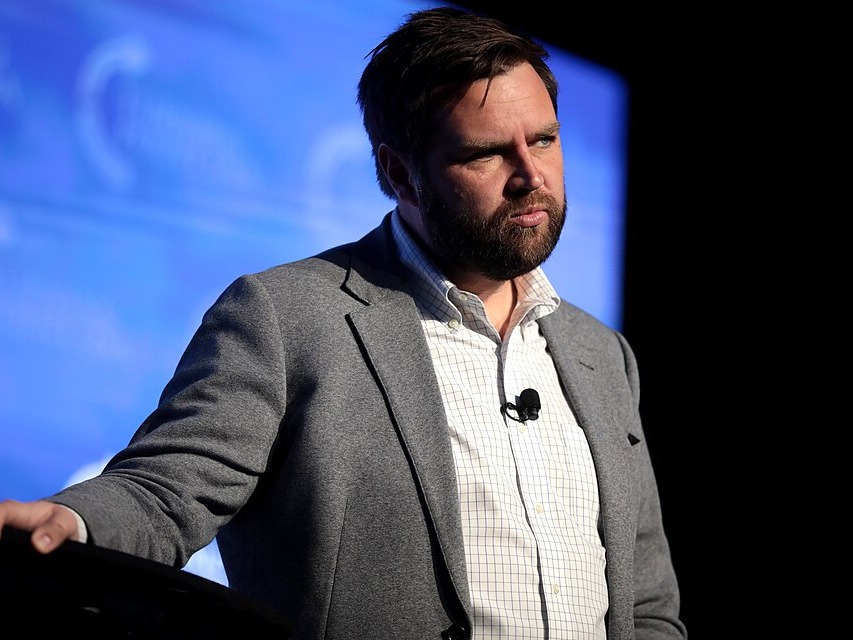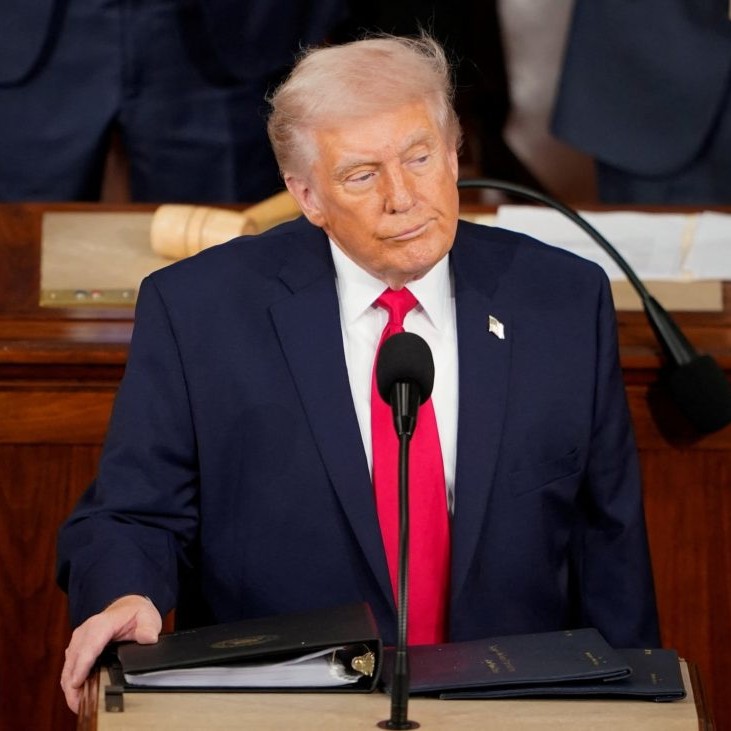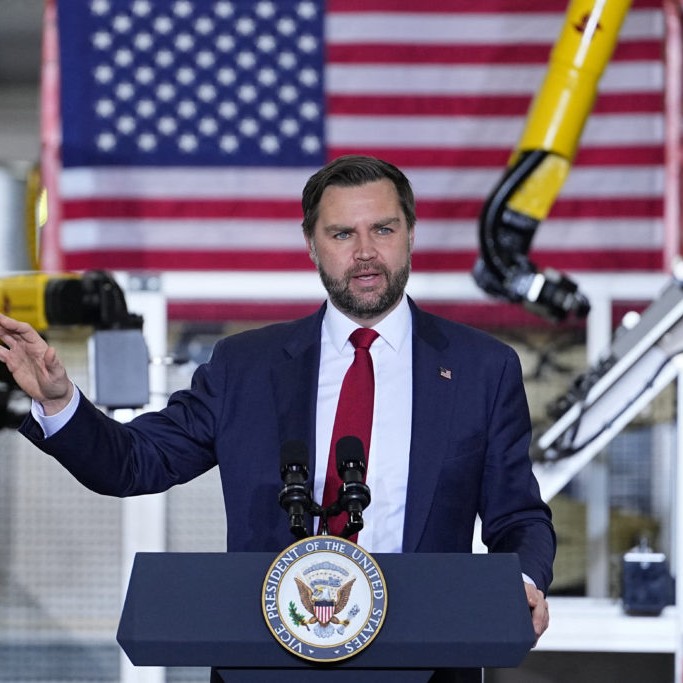
J.D. Vance speaking with attendees at the 2021 Southwest Regional Conference in Phoenix, Arizona, 2021.jpg). Photo courtesy of Gage Skidmore under CC BY-SA 2.0.
Vice President J.D. Vance found himself at the center of a storm of ridicule after reportedly making a glaring historical error during a high-profile interview. On a recent episode of “Meet the Press,” Vance confidently asserted that “every major conflict in human history… ended with some kind of negotiation,” citing World War II as a prime example to support a diplomatic approach to the ongoing war in Ukraine. The statement, however, was quickly debunked and sparked widespread mockery, raising serious questions about the vice president’s grasp of basic history amid tense geopolitical discussions.
A Diplomatic Pitch Backfires
Vance’s comments came as part of a broader defense of President Donald Trump’s evolving strategy to end the conflict in Ukraine through negotiation and compromise, rather than the sanctions and hardline demands previously emphasized. Speaking to NBC’s Kristen Welker, Vance argued that wars typically conclude with some form of negotiation, suggesting that a similar approach could bring peace to Ukraine. He said, “If you go back to World War II, if you go back to World War I, if you go back to every major conflict in human history, they all end with some kind of negotiation,” as reported by The Times of India.
The problem? World War II did not end with negotiations. Instead, it concluded with the unconditional surrender of Nazi Germany in May 1945 and Imperial Japan in September 1945, following devastating military defeats and the atomic bombings of Hiroshima and Nagasaki. This fundamental fact was swiftly pointed out by critics and fact-checkers alike, turning Vance’s historical reference into a public relations blunder.
Social Media and Community Fact-Checks
The backlash was immediate and fierce on social media platforms, especially on X (formerly Twitter), where users lampooned Vance’s misstatement. According to The Times of India, one user sarcastically asked if history was even taught in Ohio, referencing Vance’s home state. Another bluntly reminded the vice president that World War II ended with the exact opposite of a negotiation, highlighting Hitler’s suicide and the military defeat of Germany and Japan.
Adding to the public correction, according to The Daily Beast, a community note was attached to Vance’s post on X, clarifying that World War II ended with unconditional surrender, not negotiation. The note explained that Nazi Germany surrendered in May 1945 and Japan followed in September 1945, with no negotiations involved in bringing the war to a close. Although the community note was later removed, it underscored the widespread consensus that Vance’s claim was historically inaccurate.
The Irony of a Senior Official’s Blunder
The irony of this mistake is hard to miss. Here is a senior U.S. official, tasked with navigating complex international relations and advising on foreign policy, stumbling over a basic historical fact that is taught in schools worldwide. The error not only undermined Vance’s credibility but also distracted from the serious discussion about the future of Ukraine and the role the United States might play in mediating peace.
Vance’s attempt to frame Trump’s diplomatic efforts as consistent with historical precedent backfired spectacularly. Instead of reinforcing the administration’s position, it opened the door for critics to question the depth of understanding within the current leadership on matters of war and peace.
Defending the Statement
Some supporters of Vance tried to soften the blow by pointing out that post-war arrangements did involve negotiations, albeit heavily one-sided. They reportedly noted that Japan was allowed to keep its emperor and that Germany was divided among the Allied powers through diplomatic agreements after the military surrender. One defender commented that while there were negotiations, they occurred only after the Axis powers had been decisively defeated and had no real bargaining power, as reported by The Daily Beast.
Still, the majority of observers agreed that Vance’s original statement was misleading at best. The unconditional surrender of the Axis powers was a military and political reality that ended the war, not a negotiated settlement in the traditional sense.
The Broader Context: Ukraine and U.S. Mediation
During the interview, Welker raised concerns about the possibility that Ukraine might be pressured to cede territory seized by Russia as part of any negotiated peace. Ukrainian President Volodymyr Zelensky has consistently rejected such concessions. Vance sidestepped the implications, emphasizing that Ukrainians would ultimately decide their own borders and that the U.S. role would be that of a mediator rather than an active participant in the negotiations. “If Ukrainians are willing to say something on territory that brings the conflict to a close, we’re not going to stop them. We’re also not going to force them, because it’s not our country,” Vance said, as reported by The Daily Beast.
This stance marks a notable shift from earlier, more confrontational rhetoric. Just days before, President Trump met with Russian President Vladimir Putin in Alaska, failing to secure a ceasefire despite threatening “severe consequences” if the fighting continued. Vance’s comments suggest a softer approach, focusing on mediation and compromise, even if that means Ukraine might have to make difficult decisions.
What This Means for Vance’s Political Future
The historical gaffe has not gone unnoticed by political observers and opponents. Some have expressed concern about Vance’s readiness for high office, especially as he is considered a potential Republican nominee for the 2028 presidential election. Critics argue that such a fundamental misunderstanding of history could have serious implications for policymaking and international diplomacy.
Vance’s office has not immediately responded to requests for comment on the controversy. Meanwhile, the episode serves as a cautionary tale about the importance of accuracy and preparation when discussing sensitive topics on the world stage.
References: JD Vance Mocked for Embarrassing WWII History Mistake | ‘Do they teach history in Ohio?’: JD Vance mocked over ‘wars end with negotiation’ remarks; netizens remind him WWII ended with unconditional surrender – Times of India | X Doubles Down on JD Vance Mockery With Community Note for WWII Blunder







